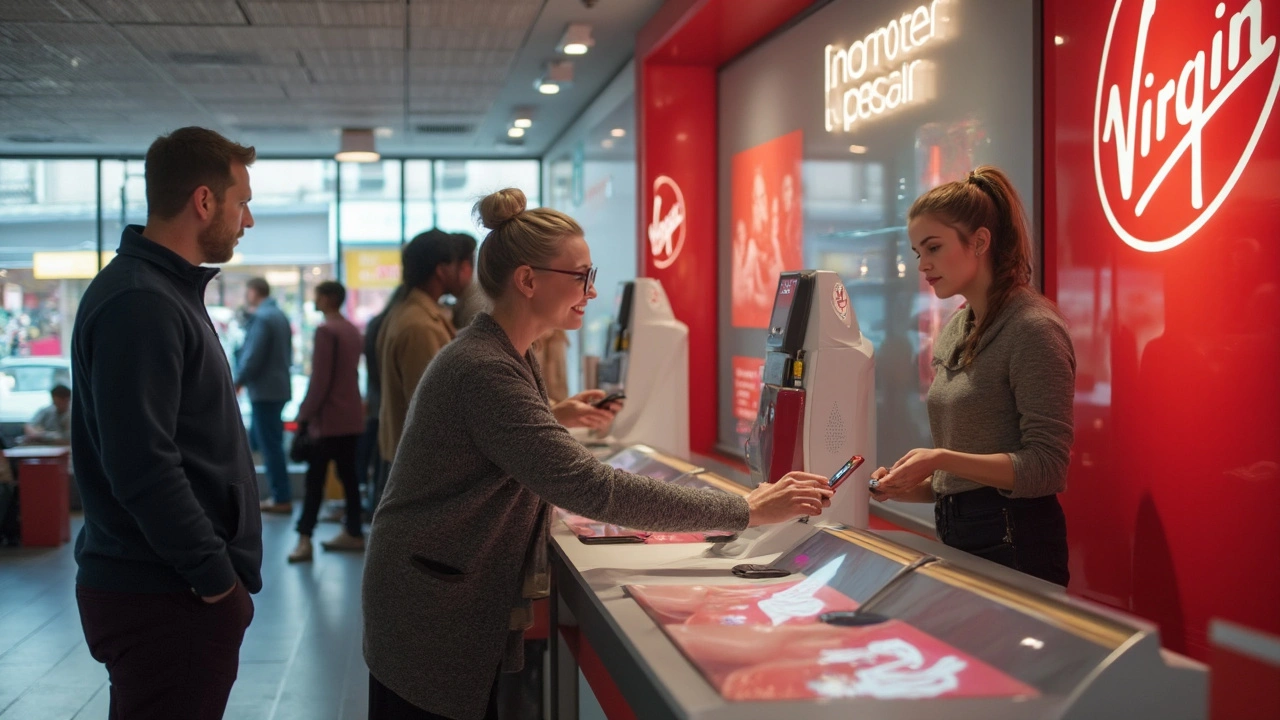
How does a high street bank born out of the loud and rebellious Virgin brand compete in a digital world where fintech start-ups release new banking features every week? That’s just one of the big questions swirling around Virgin Money UK as the summer of 2025 kicks off. In the last year, the bank has faced shifts in leadership, shaken up its app with slick new features, and wrestled with changing customer habits that threaten the very foundations of British banking. Forget the bean-counting stereotypes: this is a story of big risks, bold promises, and real-world drama that affects anyone with a current account, credit card, or mortgage in the UK.
Virgin Money UK: Major Moves, Mergers, and What’s Shaking Up the Industry
Virgin Money isn’t just another familiar face on the high street. Since Richard Branson’s brand took over Clydesdale and Yorkshire Bank, the company has thrown tradition out the window in favour of big, customer-friendly moves—and just as many headlines. In late 2024, Virgin Money’s CEO, David Duffy, stepped aside after almost a decade in charge. The leadership shake-up came at a time when analysts expected more banks to close branches than ever, pushing everything digital. Virgin Money announced the closure of 40 branches—about a quarter of their total—citing falling footfall and the rising costs of running brick-and-mortar shops. For many, especially in smaller towns, this was a painful blow; but in Manchester, there’s barely been a whisper, as most customers have gone app-first.
But if you think that’s the story of a bank just pulling back and saving pennies, think again. Virgin Money has doubled down on tech, pouring millions into upgrading its mobile app and online banking platforms. In March 2025, the bank rolled out ‘Money Mindset’, an AI-powered feature that tracks your spending habits and offers personalised nudges, budgeting help, and savings targets based on real transaction data. There’s nothing “one size fits all” about it—the app pulls in categories from subscriptions to groceries, flags risky habits, and even suggests no-spend days. It’s a big play to win over digital-first customers who might otherwise jump to Monzo or Starling.
The real twist, though, came with the rumour (now confirmed) that Virgin Money is eyeing a merger with another UK challenger bank—reportedly Metro Bank. Analysts say this would create a new kind of competition for the big players, combining Virgin’s tech vision with Metro’s strong London presence. According to a report by Reuters on June 12, 2025, banking sector M&As are at their highest since 2009, driven by the need for scale and cost-saving tech investments. As one expert told The Financial Times, “The banks that survive the next decade will be the ones that know their customers better than Google.” Whether that’s Virgin and Metro together or not, the UK banking battlefield is heating up fast.
| Year | Virgin Money Branches | Digital Transactions (per day) | Customer Base (millions) |
|---|---|---|---|
| 2021 | 162 | 950,000 | 6.5 |
| 2023 | 142 | 1,250,000 | 7.2 |
| 2025 | 100 | 1,900,000 | 7.8 |
Branch closures aren’t the only sign things have changed. The pandemic years sped up the shift to app-based banking, but Virgin Money has kept its focus on integrating its travel, credit, and even “feelgood” loyalty perks under one app. The bank’s big partnership this year is with Octopus Energy, promising energy tariff deals for customers who hold a certain balance in their current account—talk about a modern bank in your pocket. But is this enough to compete with TikTok generation fintechs who make money management look like a video game? That’s the billion-pound question.

Virgin Money Features: From Travel Cards to Tech Upgrades That Actually Matter
If you use Virgin Money for any length of time, you’ll quickly spot the features designed to carve out a niche in the crowded UK bank scene. One of the gems is their “fee-free travel card” built into standard accounts. There’s no extra cost for using your card abroad in Europe or the US, and ATM withdrawal limits beat what most legacy banks offer. A lot of young people, and especially families, book holidays without even thinking about switching to a better travel card—Virgin Money’s edge is that you don’t have to faff about opening extra accounts or sending paperwork, it just works off the bat.
Back at home, the “Cashback Boost” service has been getting real traction. If you pay certain bills (think energy, phone, or council tax) through direct debit from your account, you get up to £80 back every year. For large families who are squeezed by rising costs and mortgage rates in 2025, those small wins stack up way quicker than the pizza vouchers and cinema tickets rivals offer. Customers in Manchester’s Oldham and Didsbury areas told the BBC in May 2025 that the boosts helped cover part of their annual council tax—sometimes making the difference between putting a bit extra into savings or not.
Speaking of savings: Virgin Money shook up the market in spring 2025 with a top-rated linked saver that offered a 5.1% AER—well above the average for high street names. The catch? You have to use the current account as your main pay-in point. Loyal Virgin Money fans love the simplicity: everything is visible in the app, saving pots can be renamed for goals (like ‘Ibiza fund’ or ‘kids’ swimming lessons’), and you unlock the best rates by making the account your salary home. Even better, the “Money Mindset” AI flags ‘lazy savings’ (where cash sits idle earning a low rate) and pushes you to nudge it into a higher interest pot.
There’s serious tech under the bonnet, but the real art comes in blending it with human help. Branch closures haven’t stopped Virgin from experimenting with digital “concierge” services, especially for mortgage help. If you’re remortgaging or stumped by a tech issue, you can request a video meeting with an advisor. Not everyone is a fan—some over-50s in Greater Manchester say they’d still rather pop into a branch—but satisfaction scores in 2025 show Virgin’s digital advisors resolve issues in under 44 minutes on average, compared to over 90 minutes when customers had to wait in-branch. The numbers speak for themselves.
"The banks customers rave about these days are the ones that simplify their lives—clear info, quick help, real-time rewards," says consumer champion and financial journalist Martin Lewis, speaking on BBC Radio 5 Live in May 2025.
Here’s a quick-fire guide to hacks that work with Virgin Money right now:
- Use the 'round-up' feature to sneakily save money with every purchase—you’ll be surprised how quickly random change adds up by payday.
- Set up account alerts for big bills so you don’t get caught in an overdraft spiral (fees are high if you don’t spot this early).
- For families, link your joint accounts and use savings pots to set goals for holidays, gadgets, even Christmas expenses. Every pot is visible, so no more fights over ‘missing’ money.
- Opt in to new loyalty offers through the app—they change every month and sometimes stack with retailer promo codes.
- Double-check travel insurance perks—Virgin Money offer solid cover as part of their paid Club M account. Many customers forget to activate it in-app before travelling!
The key challenge is getting customers to explore features baked into the app. Research from YouGov in May 2025 showed over 40% of Virgin’s customers didn’t know about Cashback Boost or linked high-interest pots. It’s a classic case of hidden value—sometimes, even if the tools are under your nose, they stay unused unless you get a nudge. App notifications in 2025 are getting smarter, pushing personal tips right when people need them, not just at month’s end when the budgeting ship has already sailed.

Customer Perks, Security, and What to Watch for in 2025
Perks, prizes, and customer rewards sound good on paper, but what actually matters in 2025? Security. Virgin Money UK was targeted by a major phishing campaign in early 2025, with scammers sending texts that looked almost identical to official bank messages. The bank responded quickly, rolling out two-factor authentication (2FA) and improved push notifications in the app. By June, the bank’s technical boss, Anne Cairns, said fraud losses dropped by nearly 19% thanks to the upgrades—but she warned that vigilance is still needed as scammers get smarter. If you get a message about your account, always check the real number, never click unverified links, and call customer services using the app’s secure contact feature if in doubt.
Alongside boosted security, Virgin’s travel and family perks still win fans. As of June 2025, Club M paid account holders receive worldwide family travel insurance, free airport lounge passes (up to three a year), and 1% back on selected retail partners, including brands like John Lewis and Amazon UK. That’s a rare set of benefits for a UK bank under £15 a month. Students and young adults using the ‘Young Savers’ accounts get boosted interest and, this year, a partnership with Spotify for three months’ free Premium—a cheeky move clearly aimed at drawing in Gen Z savers before Monzo or Revolut get to them first.
But it’s not all rosy. Virgin Money, like every UK retail bank, faces criticism about branch closures hitting older or less tech-savvy customers the hardest. Disability groups have pressed for better phone support and larger font sizes on the app. The bank says they're committed to “inclusive design,” rolling out language and accessibility toggles with their latest update. Still, some users in remote parts of Northumberland shared stories with the Guardian in June 2025 about being “left behind” by the fast digital shift. It’s a balancing act—driving digital innovation while making sure no customer feels excluded.
One area where Virgin Money leads is green credentials. They’ve tied personal loans to green home improvements, offering interest discounts if you use the funds for energy upgrades (like installing heat pumps or solar panels). This is tracked via upload of receipts, verified within the app. Over 14,000 customers signed up for green loans in the first half of 2025, about double the figure from two years before. The bank also announced that all HQ energy use now comes from renewables, which, while not a customer perk, does help the brand connect with eco-minded millennials.
For anyone thinking of switching banks, Virgin Money scores high on the UK’s Current Account Switch Service, routinely processing moves in just 4 to 6 days. Their refer-a-friend bonus (a tidy £125 per switch in June 2025) sweetens the deal, and after the NatWest IT outage fiasco in April, many customers have been reassessing which banks can actually keep their money safe and their accounts accessible 24/7.
So, what’s the next chapter for Virgin Money UK? Signs point to more tech innovation, renewed pushes for digital inclusion, and, if the merger talks deliver, a reshaping of what British challenger banks can look like. Whether you’re after perks, higher savings rates, or just a bank that actually answers the phone, Virgin Money’s moves in 2025 are worth watching. And if your gran hates apps? Maybe keep a paper statement handy, just in case.